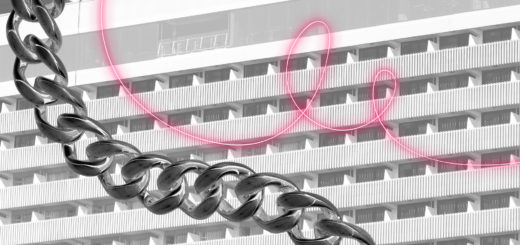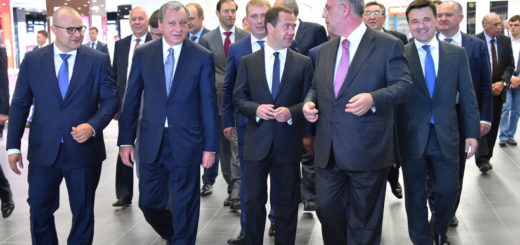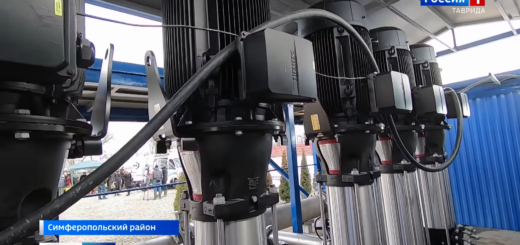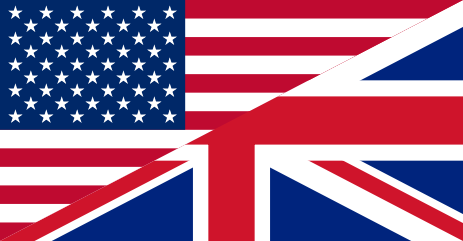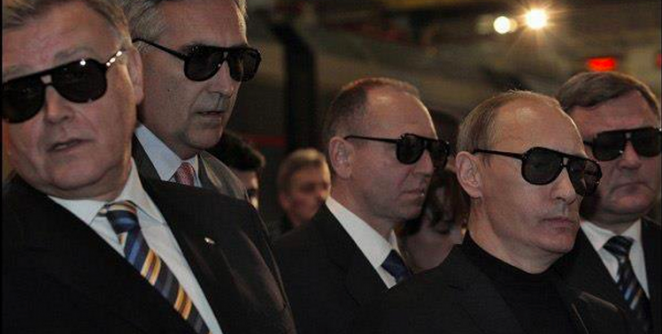Lithuanians try to save business in Crimea, draw suspicion
Lithuanian businessmen, who by twist of different circumstances find themselves in Crimea, which is currently annexed by Russia, describe the current situation as a headache. But representatives of the Russian anti-corruption non-profits say that not all of the Lithuanians in Crimea deserve sympathy.
The problems faced by the two global industrial giants — Siemens (Germany) and ExxonMobil (USA) — over the possible violation of sanctions against Russia and the Crimean Peninsula, which Moscow annexed, may be just the tip of the iceberg. After studying the enterprises, currently registered in Crimea (now in accordance with the Russian State Register of Legal Entities), researches working within the framework of the Russian anticorruption project called Municipal Scanner discovered more than 200 companies, cofounded by citizens and companies from the EU countries. Among them are several Lithuanian enterprises, which continue to work in Crimea under the sanctions regime.
In 2014, the European Union announced sanctions against Russian citizens and companies in response to the annexation of the Crimean Peninsula, which belongs to Ukraine. The single sanctions package included the measures for restriction of economic relations with Crimea and Sevastopol. Crimean products are banned from entering the EU countries, and EU citizens and companies are forbidden from investing in Crimea and Sevastopol. The ban includes real estate purchases, financing of companies working in Crimea, provision of tourist services in Crimea and Sevastopol, as well as the deliveries of goods and technologies of the transportation, telecom, energy and mining industries to this region.
The European Council Regulation from June 23, 2014 (№ 692/2014) concerning restrictions on the import into the Union of goods originating in Crimea or Sevastopol, in response to the illegal annexation of Crimea and Sevastopol, envisions a number of provisos for the businesses that settled in Crimea prior to the Russian annexation. Each article of the Regulation contains special parts with similar or identical wording: “The prohibitions and restrictions in this Article do not apply to the conduct of legitimate business with entities outside Crimea or Sevastopol, and also (…) arising from a contract concluded before 20 December 2014.”
“The European Council makes unanimous decisions on sanctions, – says the head of media relations of the European Commission Representation in Lithuania Giedrius Sudikas. – Another important body in the process of conceptualizing and monitoring the policy of sanctions is the European External Action Service. But implementation of sanctions depends on the member states.”
In order to implement the appropriate provisions of the aforementioned Regulation, on January 7, 2015, the government of Lithuania issued a decree directed at regulating the restrictions on supply of goods and services to Crimea. The Ministry of Economy was tasked with issuing permissions for such operations on case-by-case basis, subject to coordination with the Ministry of Foreign Affairs.
“Since the Regulation came in force, the Ministry of Economy received 9 requests for the issue of permits, – says the head of the Ministry’s Public Relations and Protocol Department Aušra Ramoškaitė. – Article 9 of the Law on Control of Strategic Goods specifies that the Ministry of Economy keeps tabs on the strategic goods as well as the legal entities, physical persons, and branches of foreign legal entities and other organizations, which engage in the export of strategic goods in accordance with established procedure, and on the end consumers of the aforementioned goods or the persons/entities, connected with the said goods in any other way. The Ministry uses this information to control import, export and transit of strategic goods and the relevant agency transacations. Considering all of the above, we cannot provide you with the requested information on permissions.”
Hanner offers discounts
A large Lithuanian investment company under the name of Hanner began its operations in Ukraine in 2004. It was especially active in Kiev and Odessa. The firm had built no less than 6 residential compounds in Ukraine’s main seaport. Hanner’s partner in Odessa was Oleg Radkovsky, the first deputy chairman of Odessa Regional Council.
In 2009, Hanner built a large residential compound at Gurzuf, near Yalta, on the Crimean Peninsula. Hanner’s parententerprise functioned in Ukraine through the venture investment fund Hanner-Vostok, which directly reported to the chairman of the parent company’s board Arvydas Avulis.
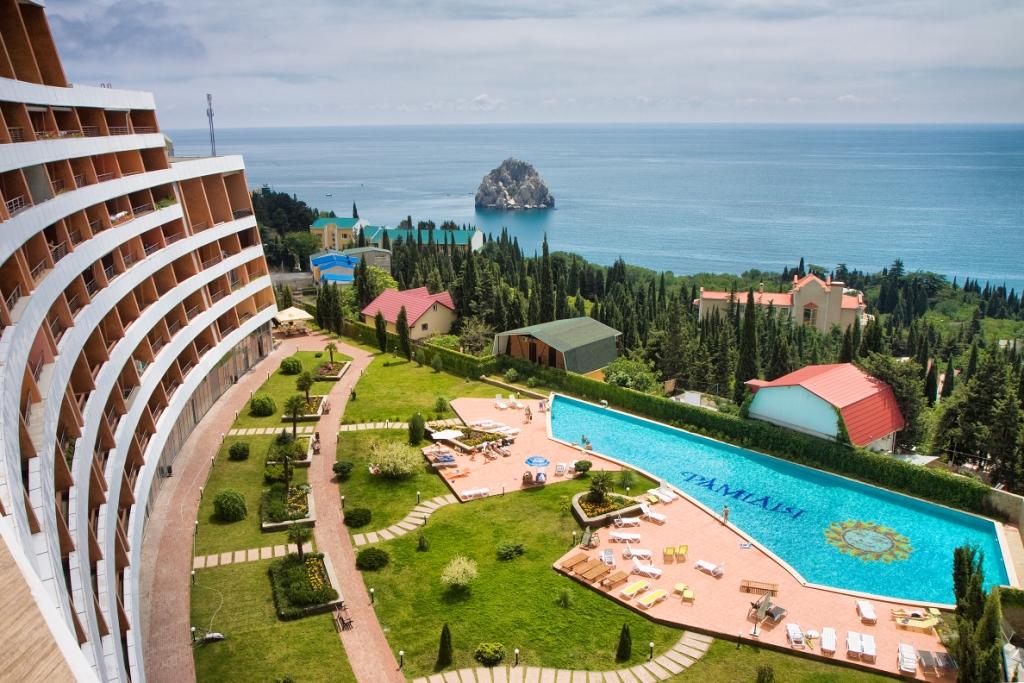
Following Crimea’s annexation and introduction of EU sanctions, Mr. Avulis re-registered Hanner-Vostok on the territory of Russia, in the Crimea, city of of Yalta, settlement of Gurzuf, at the address Stroitelei street, 3, with a charter capital of 939 mln rubles. Half a year later, on May 12, 2015, the company raised its charter capital to 1.176 bln rubles. A year later, on April 28, 2016, the charter capital was reduced to 1.063 bln rubles. In October of 2016, Hanner-Vostok changed its registration address to the village of Shushary in the Leningrad Region, the location of Northway logistics center, owned by Hanner. On June 13, 2017, Hanner-Vostok was transferred into the ownership of UAB Trust Capital (99% of shares) and UAB Ronas (1% of shares), registered in Vilnius, at Constitution driveway, 7.
These two Lithuanian firms are owned by the parent enterprise, Hanner Group OÜ, which serves as Mr. Avulis’ principal company. In 2012, he moved it from Lithuania to Estonia, supposedly for better tax conditions.
Russian activists interpret the aforementioned moves as possible violations of the sanctions regime, especially when it comes to reregistering company from Crimea to the Leningrad Region and to the increases and reductions in share capital.
Hanner’s representatives disagree with these conjectures. Hanner’s financial director Algimantas Laurinavicius claims that the said procedures were carried out as the company was searching for a way to withdraw money from Crimea or to take as few losses as possible.
In May of 2015, the Russian State Register reflected the increase in company’s share capital, because additional parking spaces and storerooms of the apartment building in Crimea were registered to the company (CNVCIF Hanner-Vostok). “Parking spaces and storerooms were added to the register later than the apartments, which is why in the register it’s reflected as a separate increase in company capital, – says Mr. Laurinavicius. – In April of 2016, the capital was reduced by approximately $2 mln in order to open a channel for return of investments in case we are able to sell the property (apartments, parking spaces, storerooms). So far, we’ve been unable to sell the property, which is why we didn’t use the said channel.”
So far, 90 apartments remain unsold at the Familia residential compound in Gurzuf. Mr. Avulis, who after the annexation made a public promise to leave Crimea as quickly as possible, claims that the situation is unchanged, since the company was unable to sell a single apartment in the last two years.
“Unfortunately, you can’t load the real estate on a ship or a truck — the merchants may have an easier time in this regard, but we have to wait,” Avulis says.
He adds that it would be ideal if some wholesale buyer from Russia bought this residential compound, but says that even the Russians are very cautious about investing in Crimea.
The apartments at the Familia compound are currently selling with a 20-50% discount, says the company’s advertising. Anna Kosareva, who is responsible for the sales, offered no less than two dozen unsold apartments at the different stages of completion (in finished condition, in shell condition, in partially finished condition) to the journalists of Verslo žinios, who introduced themselves as potential customers. She claimed that the sales process never ceased.
But Mr. Avulis says that the principal problem are the bank transfers out of Crimea, as such transactions are also under restriction. This is why Hanner moved the managing company of the Gurzuf residential coumpound to the Leningrad Region. “St. Petersburg enterprise appeared because it’s impossible to make a bank transfer out of Crimea. Nobody buys anything even with a discount of 50%, and if they do, it’s impossible to transfer the money. This is why we developed this arrangement, so that the money would partially go through St. Petersburg, where we have a normal business and the ability to take the money.”
Choosing between two evils
The Russian State Register of Legal Entities demonstrates, however, that unlike Hanner, which at least had property in Crimea prior to the annexation, and whose transgressions may be qualified as violation of sanctions procedures, a number of Lithuanian companies have purchased and registered real estate at the already annexed territory, subject to restrictive EU measures.
On November 2, 2015, the Russian company Pluošto linija LLC was registered in the Crimean city of Yalta. 80% of this company’s shares are owned by the citizen of Lithuania Vitautas Laurutis, while 20% are owned by UAB Pluošto linija, located at Panevėžys (Lithuania) and solely owned by Jonas Jakutis.
In Lithuania, Pluošto linija manufactures linen carpets under the brand Ecolinum. In the Russian jurisdiction, in addition to its traditional business, Pluošto linija LLC also engages in real estate operations.
Pluošto linija LLC owns commercial premises located in Yalta at the adress Karla Marksa street, 6A. Regarding this, Jonas Jakutis told Verslo žinios that the commercial premises, which are better described as a showroom, were acquired by the enterprise back in 2007-2008. He wonders why the Russian register doesn’t specify the date of acquisition: “At the moment of purchase, the said property was registered with the Ukrainian authorities, and we had it on our books.”
“We moved the property to the Russian jurisdiction, because otherwise we lacked access to the necessary services, such as gas, water and security. We had to choose from two evils: if we demonstrated the necessary legal steps, we would get the necessary services for our premises, if we didn’t – we wouldn’t get heat, water, gas. Our main goal is to get rid of this property as soon as possible. But no one is buying so far. It’s a headache for us,” claims Mr. Jakutis.
A partnership with a “sanctioned” bank
Like the Hanner company, another enterprise with Lithuanian capital called BT Invest began its expansion in Crimea prior to the peninsula’s annexation. The enterprise is managed by Raimondas Tumenas, who is better known for his business projects in Ukraine, not in Lithuania. The Novus outlet chain was opened on the basis of another retail chain, Alen. On March 20, 2014, Novus Ukraine distributed a statement, which defined the main principles of its activities on the territory of the annexed Crimea: “We will follow the rules of business and the rules and laws of the territory, where our customers live. Because one of the foundations of legitimate society is that business should be outside of politics. We are working for our customers. We will continue to offer our services while there’s demand for them from the people. The stores of the Novus chain are the most popular stores in Sevastopol, and Novus values such trust.”

To guarantee successful operations of the retail chain, in November of 2014 Planeta Sport LLC was re-registered in the Russian jurisdiction with a charter capital of 820.25 mln rubles. In August of 2016, Ukrainian company Danafes yielded 100% of shares in Planeta Sport to the Russian company UBK Trading LLC, which as of July of 2014 was registered in the city of Krasnodar (Russia). In July 2017, the company’s charter capital was raised to 920.25 mln rubles, while 0.11% of shares went to the Cypriot firm Skopian Holdings Limited. The said Cypriot compny manages 0,001% of UBK Trading LLC, while the rest of the shares are managed by Nigazum Holdings Limited (Cyprus).
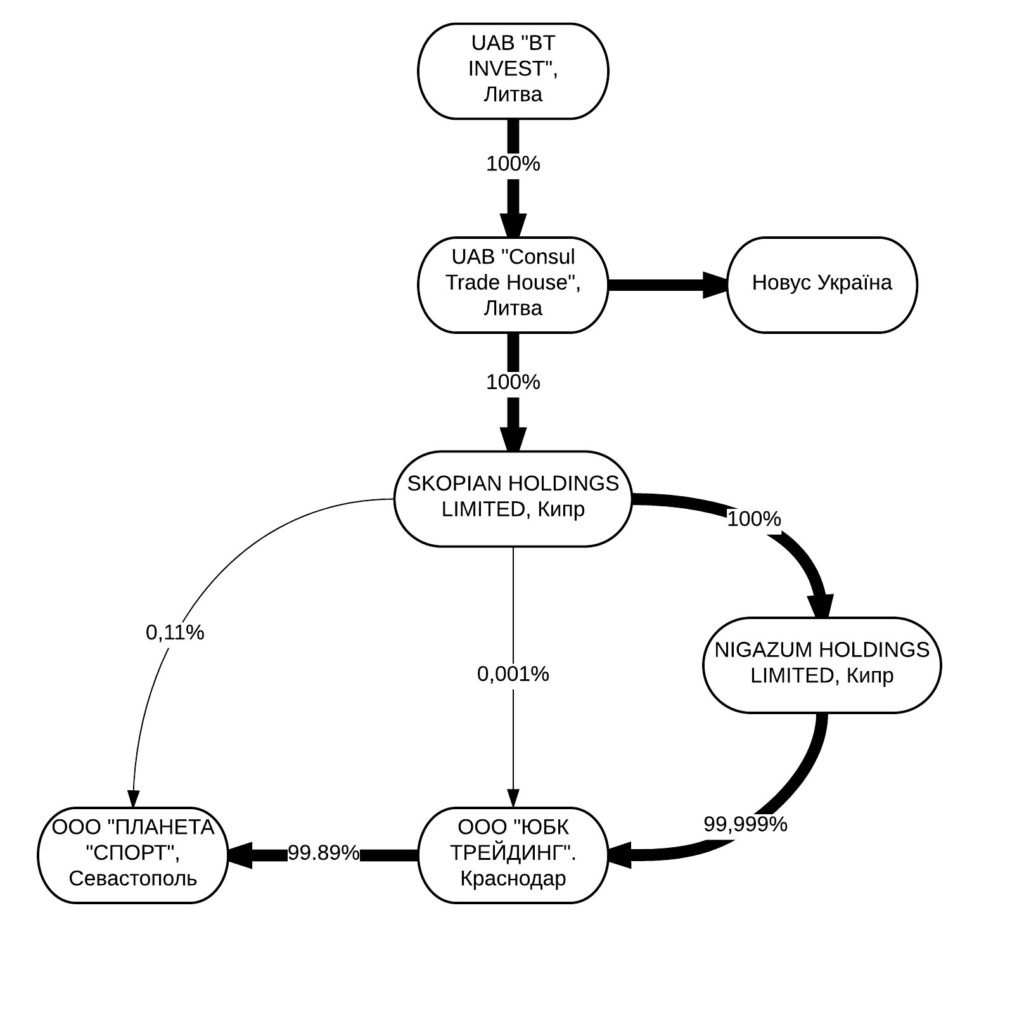
All the companies of BT Invest’s parent enterprise receive services in Cyprus from the law firm Kinasis LLC, which is connected through family ties, according to the Municipal Scanner researches, with Cyprus’ Minister of Justice and Public Order Nicolaou Ionas. Among its clients is the businessman Arkady Rotenberg, known for his close ties with the Russian President Vladimir Putin.
Along with the aforementioned reorganizations, subject to EU restriction measures, Planeta Sport LLC has won government tenders and signed government contracts. In November of 2015, the enterprise provided catering services for the international delegations to the subdivision of the Russian Defense Ministry. In 2016, Planeta Sport LLC, acting on the basis of a government contract in Crimea, provided sublease to the Russian National Commercial Bank, worth 3.8 mln rubles. This is the principal state Russian bank, which works in Crimea and is subject to EU and Canadian sanctions.
Verslo žinios was unable to get in touch with the representatives of BT Invest.
Intentionally ignored doubts
Nikita Kulachenkov from Russia’s Anti-Corruption Foundation, who works for its investigations department and has written on sanctions extensively, says:
When in 2014 the European Union and the United States introduced sanctions against Russia, the primary focus was the ban on financing and personal sanctions against private individuals. The sanctions also envision significant restrictions and bans on activities of European and American legal entities and private individuals in Crimea.
There are no international flights into Crimea, there are no branches of large Russian banks, and McDonalds restaurants have been closed. It is forbidden to deliver equipment for energy infrastructure to Crimea, and the unfolding scandal with Siemens is likely to have a considerable effect on the Russian-German relations.
But the EU sanctions do not apply solely to the large corporations, which is why the activities of small Lithuanian companies in Crimea, discovered by the Municipal Scanner project, are the same violation as the delivery of turbines for the power stations.
In accordance with EC Regulation № 692/2014 (article 2а), private individuals and legal entities of the European Union are forbidden from buying stakes in legal entities in Crimea or increasing their existing stakes. It is also forbidden to provide any financing to the Crimean legal entities, including contributions to the charter capital. In such a way, all three instances, discovered by the Municipal Scanner, directly violate the said Regulation.
The Regulation contains certain exceptions for the contracts, signed prior to the issue of sanctions, but the discovered cases do not fall within the scope of such provisos. Therefore, the fact that these Lithuanian and Cypriot companies did business in Crimea prior to the annexation, is no more than a mitigating circumstance.
Moreover, the Russian National Commercial Bank, which leases offices from one of the companies, has been added to the special European and American sanctions lists. Operations with the said bank are forbidden to companies from the EU and the US, and moreover, the US sanctions (Decree 13660, section 1-(iv)) envision arrest of assets of all persons/entites who provide services to the companies from the list. This means that any bank transfer of the Lithuanian and Cypriot companies of the BT Invest group may be blocked, even if such transfer has no connection to the activities in Crimea.
I doubt that all of the aforementioned Lithuanian companies ignored the sanctions and worked in Crimea intentionally. Most likely, they’ve heard something about the sanctions, but thought that they only apply to the large companies. For this reason, the European authorities should promote awareness about restrictions, caused by the annexation of Crimea, among the citizens of their countries.
What are the penalties
Representative of Lithuania’s General Prosecutor Rita Stundene explained to Verslo žinios that the Criminal Code of Lithuania contains no special norms regulating criminal liability for violation of the said EC Regulation.
Article 1231 of the said Code (“Violation of international sanctions”) addresses the liability of persons who violated international sanctions carried out in Lithuania and thus caused great damage to the interests of Lithuania. Such persons are subjects to punishment by fine or arrest or a prison sentence of up to five years. The same rules are applied to the legal entities.
The parties are also liable under the Criminal Code in cases when they commit a crime (such as smuggling, etc.) in carrying out activities that violate the EC Regulation. However, the information system contains no criminal activities of the aforementioned category (when the Council Regulation was violated).
Position of the Lithuanian Foreign Ministry
Principles: Lithuania steadily supports independence, sovereignty and territorial integrity of Ukraine. We are principled in our evaluation of Russia’s aggression against Ukraine and the unlawful annexation of Crimea. When in 2014 the European Union announced sanctions tied to the annexation of Crimea, we distributed a document, detailing the guiding EU principles for business entities that ran operations on the territory of Crimea/Sevastopol, which were annexed by Russia. The said document explains how the enterprises should behave, finding themselves in the situation when legal instruments of the Russian Federation were defacto introduced on the Crimean Peninsula. The guiding principles specify that business in Crimea/Sevastopol may be carried out on the condition that the entity/person in question take upon themselves responsibility for future activities under occupation, but they also clearly state what kind of activities are banned by sanctions and cannot be carried out.
Regarding possible compensations to businesses working on the territories subject to sanctions: the goal of international sanctions is to change the policy conducted by the government, entities or private individuals of the relevant country, or to engender cessation of specific actions. Application of international sanctions is justified not by the economic interests, but by the principles of international law, democracy, respect for the human rights, and basic freedoms. There is no work to introduce compensation measures tied to the sanctions. The general order, which permits execution of contracts and contractual obligations, signed prior to the introduction of sanctions, remains in force.
Regarding liability for non-compliance with sanctions: legal entities and private individuals may face administrative or criminal liability for non-compliance with the sanctions regime. Decision on whether specific entity/person violated the sanctions, established by the EU legal instruments, is made by the law enforcement agencies in accordance with the legal enactments of EU and Lithuania. Lithuanian legal entities and private individuals should observe sanctions in the same way as they observe the laws of Lithuania.
Regarding duration of sanctions: the sanctions tied to the occupation and annexation of Crimea were introduced in July 2014, and since then they have been unanimously extended on the regular basis. There is a common agreement within the EU that Crimean sanctions will be extended until unlawful annexation of Crimea is over.
Mikhail, Rytas Staselis
